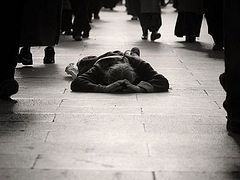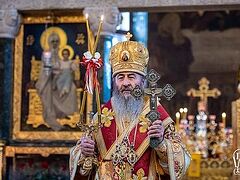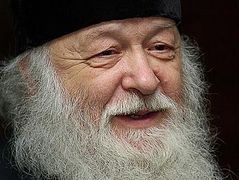Beloved, today we heard our Lord reveal to us an event that has not yet occurred: the Final and Last, Terrible Judgement. We are two Sundays from the inauguration of Great Lent, which will occur one week from today. We confess our faith in this future event each time we say the Nicean Creed—corporally as a Eucharistic assembly in unison at the Liturgy. We confess we are searching for it, “looking” to it, or looking for it. “I look for the resurrection of the Dead and the Life of the World to Come”—this we proclaim and confess. This is the sole culmination of the Church’s prayer: that Resurrection and immortality may be poured forth abundantly by Christ to the world. This is why the holy scriptures end with the words: “Come Lord Jesus, come.”
With His Third-Day Resurrection after enduring the Cross and the Burial and Descent into Hades, Christ inaugurated the defeat of death—the ultimate celebration of which we are marching towards, Pascha. On the Paschal night a window is opened toward the eternal day which knows no sunset. We march towards an event which has occurred, is occurring, will occur for us on the individual level at the time of our death, will occur for mankind at the end of the age... the Second Coming, the Eternal Pascha, the passing from death to life. Every moment of our lives should be an affirmation of Christ’s Resurrection, a witness to the eternal defeat of death. And our deaths, if we live a Christian life, will each be an iconic manifestation of Christ’s Resurrection, the consummation of the sum total of our Christianity, of our Christian life.
Therefore, today we commemorate an event which has not yet occurred and which precedes the eternal Pascha: the Last Judgement.
The Last Judgement is the presence of Christ in the world: When the Son of Man comes in His glory with the holy angels, the heavens will shake, the dead will arise, all generations, mankind as a whole—everyone who has lived throughout the sum of history will stand before Christ. They will stand before His light, His majesty, His glory. His presence will envelop all. We are projected to this Last Judgement at the time of our death: it occurs for us on an individual scale. When we die, we suddenly find ourselves in Christ’s presence, and according to how we have lived there we will go—some to a resurrection of life, others to a resurrection of judgement. This is why the Fathers appointed that the day before today—named Soul Saturday or Ancestral Saturday—be set aside as a universal commemoration of all those gone to their rest in Christ.
There is no judge at this judgement, however. There is no jury and no courtroom. These are all emblems of earthly justice. At the Judgement, the “justice” of the heavenly King reigns: love and mercy and glory and righteousness, according to St. John Chrysostom are the instruments of His supreme judgement. By these the Lord will judge, He will separate, He will reveal the true nature of all things. Those inheriting the Kingdom prepared for them before the World’s foundation will inherit it because they have participated, they have toiled, they have consumed themselves, and—as we grind the wheat—they have sifted their hearts, for Christ’s love.
Where have they done this? In the service of neighbor. In the service of the “least” of these. “I was hungry and you fed me. I was thirsty and you gave me to drink. Naked and clothed me. Sick, and you comforted me. In prison and you visited me.” They will ask, “Lord, when did we do any of this?” and He will say “Amen, I say unto you, as you did it to the least of my brethren you did it unto me.” Amen means “so be it” and it is said at the ending of each prayer. Yet here, the Lord uses it at the beginning of the statement in question as if to say: “Pay attention! This is a true, unquestionable fact.” The second point is the Lord calls the poor, the suffering, the forgotten His brethren. God, the maker of heaven and earth who became incarnate for each man and woman who comes into the world, Who calls each one to hear the voice of His Truth, does not equate Himself with the rich and mighty in this world, but with the poor, the downtrodden, the drug addicts if you will, the prostitutes if you will, the vagabonds if you will—those stuck in the margins of our society.
And to those on the left He will repeat the statement above in the negative. “I was hungry and you did not feed me, thirsty and you did not give me to drink, sick and in prison and you did not visit and comfort me.” Then He will curse and condemn that portion of humanity destined for damnation, that portion of humanity which opposed His plans and His Kingdom and persecuted the least of His brethren. These miserable ones will go to an unending, eternal punishment. Yet the Lord also reacts to these with mercy and love. His judgement is mercy and all His ways are justice as the Prophet-King declares in the Psalms. Why should those who did not live Paradise on earth, who did not further Christ’s Kingdom in the world, who did not wish to know it or participate in it or meet Christ as their friend and brother, as the God-Man who is the source of existence and life—why should these be forced to endure a condition not in keeping with the sum-content of their lives? Would the placing of these individuals in the Kingdom, in the land of the living not be cruel?
The righteous will go to the eternal, everlasting Kingdom. They will walk into the day which knows no evening. We live this day, as I mentioned, on the Holy Pascha, at the night Liturgy. Who does not know this feeling? Which Orthodox Christian has not felt this joy? Which one of us, perhaps even the most cold-hearted—perhaps, even the most indolent and faithless among us, such as the Greek Alexandrian writer Kaváfi who wrote about his yearly compulsive necessity to join the Paschal service at his native village parish, to re-live the memories of childhood joy sparked on that night by the faith of his grandmother—I ask, which one of us has not felt this joy? Which one has not glimpsed into the Kingdom prepared before the foundation of the world?
Now we must ask ourselves. We have glimpsed into the Kingdom. Do we wish, however, to inherit it? Fr. Thomas Hopko of blessed memory said: “Christ’s judgment is on if we had love towards others.” The Lord has given us a mighty commandment: to love. And to love unconditionally. We must love the Lord God with the totality of our mind, our heart, our soul and our strength. With our mind, that is with our thoughts, conscious and unconscious, and with our musings. With our heart, with what we love and how we love. Do we love so others may live? Do we lessen ourselves so they may be exalted—as St. John the Baptist did for Christ? This does not mean to put ourselves down or to neglect ourselves so others may take advantage of us. That would be an unwise investment of the talents bequeathed to us and for which we will give an account. We must enable ourselves, we must positively invest in ourselves in order to better others, to uplift others. Do we love the Lord with our strength? Here, strength does not mean physical power, but our money, our wealth, our worldly influence. Are we wise stewards of what Christ has given us? Do we support our local parish financially, do we invest in our mission? One priest once said, “Your money is your life”—and rightly so. You spend it on raising children, on what you find absolutely necessary and indispensable in life. If your faith is indispensable, why would you not pour a portion of your proceeds into building and maintaining a parish that will spiritually nourish the next generation, which will spread Orthodoxy, wherein you will be remembered prayerfully at the holy Liturgy for decades, if not centuries, after your repose?
Do we spend our hours and days in doing the work of Christ? Reaching out the lonely, the forgotten, the homeless, those in prison? Or are we consumed in the castle of our own concerns? Let us start here to slowly make the difference, one person at a time, one soul at a time. In our day-to-day interactions, let us seek to serve, to see Christ in everyone, and not to be served. Let us see everyone for what they are: an icon of the living God. If we do this, on that day of the Last and Terrible Judgment, “We shall see Him as He is”, in the words of St. Sophrony the Athonite.
St John of Kronstadt teaches us: “Truth is royal, it has the right to speak thusly. Moreover, we have the utmost need to speak emphatically about the preparation for the judgment. When we are clearly confronted with the eternal perdition of souls due to carelessness and negligence, then we must act decisively, and then even more decisively than at other times when we must speak the truth! Think, maybe this night your soul will be required of you (Luke 12:20), and you will be in hell, in torments… all in flames. Thus, be prepared for the judgment, start preparing today. Work the works of Him who sent Me while it is day: The night is coming when no one can work (John 9:4). We have worked for vanity long enough. It is time to look upon our poor soul with testing eyes.”
We cannot find ourselves in ourselves. If we seek happiness and pleasure, we will only find it in the service of neighbor. Self-love—φιλαυτία—according to St. Maximus the Confessor, is destructive because it is the original sin. By engaging in self-love, we consume ourselves and ultimately destroy ourselves. In the Psalms and Proverbs, we read that we will stand on the last day according to the works which we have done. So let us hasten in the little time-span called our lives to do good works! Let us hasten to labor for friend and neighbor and stranger and enemy, to the widows and the shut-ins and the elderly and the homeless and the sick and all who suffer and are in need of a cold cup of water in His Name. Our entrance into the Kingdom is not obtained by confirmations, by statements of faith, by battle cries for this or that cause.
Our entry into the Kingdom is obtained by the works of faith—and only if they are done in love. If they are done from ego, as a comparison to the works of other men, as a statement of vainglorious boasting, the Lord will reject our work as a poor offering unworthy of His consideration. St. Cyprian says, some sought martyrdom yet their sacrifice was rejected by Christ due to their vainglory. Many will appear that day and say to the Lord, we cast out demons, we did miracles, we prophesied in Your Name. And all these will be rejected because they did not serve with love. And yet, many other strangers on that day will come from East and West to sit at table with Abraham and Isaac and Jacob, and the sons of the kingdom shall be cast to the outer darkness.
Each Liturgy we live the Last Judgment. “The Cross, the Tomb, the Resurrection on the Third Day, the Ascension into Heaven”—the priest says these words before he lifts the gifts and then he adds, “the Second and Glorious Coming Again.” Christ’s invitation to the Liturgy is to an eternal banquet, to an eternal feast wherein He is the supreme victim, the offering, and the High Priest who offers. Therefore, Christ invites us to a Kingdom of Communion—not a good “place” or a “magical” heaven, the likes of which we read about in ancient folklore. Christ invites us to the Kingdom of Communion. How do we win our citizenship in this Kingdom? By love and sacrificing our lives for those less fortunate than us. By consuming ourselves in the ministry of our neighbors. By investing in our parish and promulgating the Orthodox Faith. When we see the priest entering the altar at the Great Entrance as he says, “You and All Orthodox Christians, may the Lord God remember in His Kingdom,” let our minds then be translated to that terrible day of the Last Judgement.
The priest, at the Great Entrance, enters the altar alone (without the laity) to celebrate the Liturgy. And yet on that Final Day all those who loved truly, sincerely, sacrificially for friend and neighbor will hear Christ saying, “Come you blessed of my Father, come inherit the Kingdom prepared for you before the foundation of the world”, and then they follow Christ in that Great Entrance, as they enter the Kingdom with Christ the God-Man, the eternal High Priest, to partake of the eternal Liturgy, celebrated by Him, celebrated with Him, communing of Him, forever.




